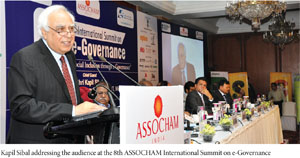 The scope of human intervention must be reduced with information and telecommunication technologies playing a lead role to curb corruption in public life and ensure good governance across the country, said Minister for Communications and Information Technology, Kapil Sibal, while inaugurating the 8th ASSOCHAM International Summit on e-Governance.
The scope of human intervention must be reduced with information and telecommunication technologies playing a lead role to curb corruption in public life and ensure good governance across the country, said Minister for Communications and Information Technology, Kapil Sibal, while inaugurating the 8th ASSOCHAM International Summit on e-Governance.
Though the government is working on a new law to deal with the menace of corruption, only mass adoption of technologies for e-governance and m-governance can improve the quality and speed of public services, he said.
He added, “Much of the talk of corruption that we have had in the recent past will be dealt with through the initiative of Information Technology (IT). What we need to do is to ensure that the scope of human interface which is the scope of all corruption – is excluded. IT should play an important role in finding solutions and we are in the process of doing it.

By 2014, every Gram Panchayat in the country will be connected with fibre optic cable and last mile connectivity will be provided through wireless broadband. The true empowerment of people would be possible when government services are made available at the doorstep of every citizen – be it for tax returns, insurance premiums, banking operations or payment of e-bills.
“Increased use of IT will bring transparency and accountability in the system,” said Kapil Sibal adding the government will introduce the Electronic Services Delivery Bill in the next session of Parliament. The Bill is aimed at providing public services by all the government departments in the Centre and states in electronic mode only over the next five years.

Dilip Modi, President of The Associated Chambers of Commerce and Industry of India (ASSOCHAM), said the critical pillar of the chamber’s agenda of ‘making inclusive transformation to happen’ is digital inclusion. “e-Governance can bridge the gap between deficits and surpluses in rural and urban India. With 6 lakh villages in the country, land records need to be digitised. We are quite bullish on the Internet’s potential to provide fair transparent governance structures,” Modi added.
Umang Das, Chairman of ASSOCHAM National e-Governance Council, said the concept offers a unique opportunity to move away from piecemeal reforms to an era of institutionalised transparency.
Hardeep Singh Bedi, Co-chairman of ASSOCHAM National e-Governance Council, said India has 73 million internet subscribers and the figure is poised to grow to 275 million by 2015. The telecom sector has been a key driver for this growth, he said.
ASSOCHAM Secretary General D S Rawat said with nearly 60 million mobile phones in the country, all government websites should be made mobile-compliant. The vision should be to touch and transform lives of citizens through the use of IT, and lead the nation into a globalised knowledge economy.
Other experts said technology intervention could possibly make Mahatma GandhiNational Rural Employment Guarantee Act (MGNREGA) implementation better for job seekers, common man and society at large. Mobile technology can be used for applying for job cards, enrollment for work and real time monitoring of work at sites.
Among those present were Jammu and Kashmir’s minister for IT Aga Syed Ruhullah Mehdi, Gujarat’s Additional Chief Secretary Ravi Saxena, B.K. Sinha, Secretary, Rural Development Ministry and Sunil Kanoria, Vice-Chairman of SREI Infrastructure Finance Ltd. eGov was the media partner for this knowledge sharing initiative.
Be a part of Elets Collaborative Initiatives. Join Us for Upcoming Events and explore business opportunities. Like us on Facebook , connect with us on LinkedIn and follow us on Twitter, Instagram.











